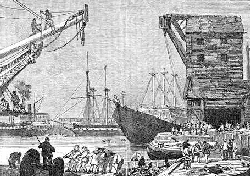Crimping
We all think we know what crimping means, but the usual idea of compressing something into small folds has nothing to do with this process — or at least so far as we know, since it is of uncertain origin. This crimping means impressing men into the army, navy or merchant marine. It was like press-ganging, but done on a freelance basis by men acting as agents or go-betweens.

Beware crimping
That reflects the relevant sense of crimp for a man who crimped. It’s recorded from around the middle of the eighteenth century, for example in John Blake’s A Plan For Regulating the Marine System of Great Britain of 1758: “When a master of a ship hath lost any of his hands, he applies to a crimp who makes it his business to seduce the men belonging to some other ship.” It also appears in a better known work, Frederick Marryat’s Mr Midshipman Easy of 1836: “Offering three guineas ahead to the crimps for every good able seaman.” Writers in the later eighteenth century had fun comparing crimps with pimps but there’s no etymological connection.
The impressed men were often temporarily imprisoned in a crimping house before being handed over. In 1794, a man attempted to escape via a skylight from one near Charing Cross in London that was run on behalf of the East India Company but fell to his death. This led to riots in which several such houses were destroyed by the mob.
Another word for the process was trepanning, which probably has no linguistic link with the medical technique of cutting a hole in the skull. We know little about where it’s from; the Oxford English Dictionary says that it is “a word of obscure and low origin, probably originally a term of thieves’ or rogues’ slang.” To trepan someone (stress on the second syllable) was to entrap, inveigle, ensnare or lure them into some situation not to their benefit. It was of wider application than just press-ganging and some contemporary writers made a distinction between the two methods.

